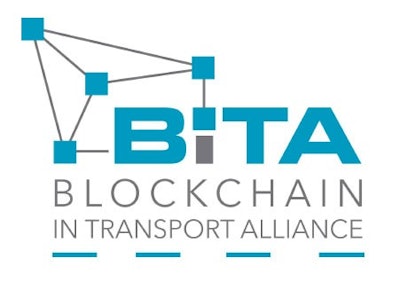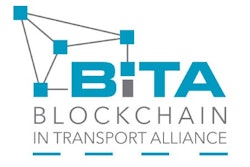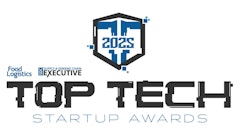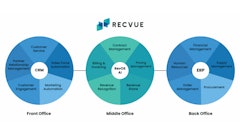
Do a quick search for the Blockchain in Transportation Alliance, or its better known acronym BiTA, and you are sure to find a slew of well-known and respected logistics providers. It seems every day another big name in the transportation sector announces it has joined. BiTA was founded in 2017 to create a forum for the development of blockchain standards and education for the freight industry. According to the alliance’s website, its goal is to bring together leading companies in the freight technology industries that have a vested interest in the development of blockchain technology.
Thousands of companies from every facet of the industry—tech vendors, OEMS, suppliers, consultants, banks, carriers, shippers and brokers—have joined with hopes of leading the charge in what many believe will be a revolutionary technology. Members share in a unified mission of developing a standard framework, educating the market on blockchain applications and encouraging the use of said applications through implementation.
Scrolling through the member list is impressive as many names instantly grab your attention—UPS, SAP, Uber Freight, P&G, to name a few. But the smaller players may have the most to gain. Third-party logistics provider Kenco, which announced its membership in March, hopes to influence the use of blockchain on the same scale as those big names.
“We wanted to have input into the standards of how blockchain will be used in our industry,” explains Kristi Montgomery, vice president of innovation, research and technology at Kenco. “As we look back at technologies that have evolved over time, typically what happens is your largest players in the industry tend to be the ones who everyone is listening to and leading the charge in developing standards. What BiTA is doing is very different; they’re saying that everyone has a voice.”
Kenco is a mid-tier player in the logistics space compared to a FedEx or UPS, and yet the decisions that are made now to determine how blockchain will work in the transportation industry will greatly impact companies of all sizes. “We didn’t want the players who had all the money to make all of the decisions, because they might not be thinking about it from the same perspective that we are. We felt like we wanted to have impact into that,” adds Montgomery.
Kenco’s service offerings span the entire supply chain. They hope their particular voice will broaden the alliance’s horizons, forcing them to look at the supply chain as a whole, including the warehouse component of it and backing even into on-plant services. Montgomery says they would like to see BiTA ask the question: “How do we take blockchain and apply it across the supply chain, not just the transportation component?”
Teamwork Makes the Dream Work
Because blockchain is not yet a fully developed technology, companies big and small must work together to determine what makes the most sense in its standardization. Questions surrounding blockchain in the transportation industry abound, but BiTA members are focused on unanimously answering the seemingly simple ones such as: How are we going to use it? How are we going to set it up? What is the framework and platform going to look like?
And who better to answer these questions than the people who work in the industry every day. “We want to make sure that [blockchain does not become] a vendor driven, software provider driven solution, but it’s those of us who have to live, work and breathe this industry every day that are defining how it works best for us,” says Montgomery.
She adds: “If every major transportation company has their own set of standards around blockchain, it becomes very difficult for us to collaborate on behalf of customers. From the shippers’ perspective, blockchain will best serve them when it is standardized and they have visibility across every vendor and supplier to their entire network of their supply chain.
“It won’t work if everybody has their own way of doing it. It’s not going to ultimately serve the customer, and the BiTA founders recognized that early in the process.”
That unique sense of collaboration is one of BiTA’s most attractive characteristics. Collaborating with—to some extent—their competitors is a unique concept that is driving important discussions within the alliance.
“Most people look at blockchain and it becomes a really cool thing to talk about, but there is no real value in a single entity joining the blockchain,” Montgomery explains. “The value comes when I am serving my customer and their other five suppliers. When we are all on the blockchain together, now our customer has visibility end to end in everything that’s happening along their supply chain, and they have full track and trace at the SKU level. Now it becomes a really valuable offering.
“We recognize that running a pilot for blockchain is going to take multiple suppliers collaborating for a single upstream customer,” she adds.
Currently, there are a few isolated pilots, such as the one IBM and Maersk announced in January. The duo hopes to use blockchain technology to provide more efficient and secure methods for conducting global trade. But Montgomery emphasizes that “we don’t want IBM setting the standards for how everybody uses blockchain.”
Ready for Takeoff
BiTA hopes to publish a set of standards by the end of 2018. Once the standards are established, the organization plans to move forward with a number of pilots based on use cases in transportation they have identified. Such use cases may include:
- Track and trace, chain of custody
- Simplification of ELD compliance
- Fraud prevention, security of product
- Dynamic optimization of capacity
- Performance history around assets
- Smart contracts
- Reduction of paperwork
“The horizon for real strong usage of blockchain is 1-3 years, and by year three, it’s going to be driven by some extent our customers,” adds Montgomery. “We want to make sure that when the Walmarts of the world come to us and say, ‘OK, we want you to be part of our blockchain,’ we are prepared, we have the standards, we understand how the framework is going to work and that we are ready to make them successful.”
Follow Amy Wunderlin on Twitter.
















![Pros To Know 2026 [color]](https://img.sdcexec.com/mindful/acbm/workspaces/default/uploads/2025/08/prostoknow-2026-color.mduFvhpgMk.png?ar=16%3A9&auto=format%2Ccompress&bg=fff&fill-color=fff&fit=fill&h=135&q=70&w=240)




